- Home
- Amelia Grey
The Duke in My Bed
The Duke in My Bed Read online
The author and publisher have provided this e-book to you for your personal use only. You may not make this e-book publicly available in any way. Copyright infringement is against the law. If you believe the copy of this e-book you are reading infringes on the author’s copyright, please notify the publisher at: us.macmillanusa.com/piracy.
Contents
Title Page
Copyright Notice
Chapter 1
Chapter 2
Chapter 3
Chapter 4
Chapter 5
Chapter 6
Chapter 7
Chapter 8
Chapter 9
Chapter 10
Chapter 11
Chapter 12
Chapter 13
Chapter 14
Chapter 15
Chapter 16
Chapter 17
Chapter 18
Chapter 19
Chapter 20
Chapter 21
Chapter 22
Chapter 23
Chapter 24
Chapter 25
Chapter 26
Chapter 27
Chapter 28
Epilogue
Author’s Notes
Teaser
About the Author
Copyright
Chapter 1
What’s done cannot be undone.
—Macbeth, act 5, scene 1
Hyde Park, 1815
Bray Drakestone, Marquis of Lockington, heir to the dukedom of Drakestone, sat in the curricle, every inch of him shuddering in pain. Not that anyone would know to look at him. He’d learned from a young age not to show any emotion, much less reveal pain. That this pain came from an overabundance of brandy didn’t make it better. In fact, his father would have preferred he experience the searing agony of a bullet or saber wound than a pounding head and blurry eyes from drink.
Bray had never listened to his father, other than to absorb the lesson of never displaying emotion, any emotion. That skill had served him well.
“Are you going to take what’s left of the night to decide if you are up to the challenge, Lockington?” Viscount Wayebury asked him.
Bray pressed his eyes closed. The challenge. Damn.
After a moment, Bray glanced in the viscount’s direction. Whorls of misty fog that drifted across Rotten Row made it nearly impossible to make out the man sitting in the curricle not ten paces from him. Earlier, Bray had noticed an eerie halo surrounding the oil lamps that lit the well-worn road.
His horse stamped and snorted puffs of warm air while jerking its head and rattling the harness of the small sporting carriage. The animal obviously didn’t like being out in the damp cold either.
Bray didn’t know Wayebury as well as some of his other friends. The two of them hadn’t attended the same schools, but they spent a lot of time together whenever the viscount was in London. Wayebury had said that he preferred the quietness of his estate in northern Cornwall, but if that was the case, he seldom went there. He seemed always to be in London, behaving as wild as the next young buck who had nothing but time on his hands. They were both members of the Heirs’ Club and they enjoyed their share of bets on gaming, shooting, and horse racing, but never had they made a wager on such a dark and murky night.
Bray heard the viscount’s dog bark up at his master. Lord Wayebury looked down at the spaniel and said, “Don’t worry, ol’ boy, I know what I’m doing.” He then shot another glance at Bray and bragged, “It wouldn’t be worth the money we’re betting if there wasn’t a little risk involved, now, would it, Lockington?”
Those were brave words coming from the viscount, so Bray huffed a laugh and released the brake handle. The bleating tosspot possessed stellar gambling fortitude. “Indeed, the dark and the fog make the amount and the win all the sweeter,” Bray answered.
The broad but fairly short pathway called Rotten Row could be hazardous for two carriages careening side by side in the light of day and best of weather, but on such a dreary night, not even the lamps could alleviate the gloom. Quite frankly, Bray couldn’t have cared less if they raced or not. Losing a couple of hundred pounds wouldn’t lessen his pockets nor would winning it add to their weight. But since his days at Eton, what he didn’t like was losing—be it a fortune, a horse, or a shilling. He always played to win.
Like him, Wayebury had been at the Heirs’ Club since early evening, and the brandy was now talking and thinking for both of them. Bray had never declined a bet or rejected a dare, no matter how dangerous the challenge or how foxed he was. He wasn’t going to start tonight.
He had no idea how good Wayebury was handling the horse and lightweight curricle, but Bray didn’t figure he’d lose, even though he’d felt none too steady on his feet when he left the club. He’d been racing curricles as fast as the horses could pull them since he was big enough to climb onto the seat. And the carriage under him now was well sprung and built by a master of the trade.
“Does everyone have their bets placed?” someone called to the gathered crowd of a dozen or so men who had trailed the two young bucks out to the park. Some were afoot, others on horseback, and one or two were in their own carriages. They all would follow Bray and Wayebury down Rotten Row, but at a much slower pace.
Bray heard the grumbling rumble of various voices, which he took for a collective yes.
He wanted to get this over with. He was through with the night and ready for bed. He gave his head a quick shake and tuned his senses to the night and the restless stomp of his horse. He looked over at the man who had agreed to start the race and said, “Step back, pull your weapon, and fire when ready.”
The pistol shot cracked the air. Bray slapped the horse’s rump with the strips of leather, and the carriage took off with a jerk and a rattle. The road seemed bumpier than usual, at times lifting Bray out of the seat as they sped down the lane. He leaned forward, blinking several times to clear his eyes, but the brisk wind and the overindulgence in the brandy had taken their toll.
Knowing they were near the end of the lane, Bray glanced over at Wayebury. They were staying dead even until Prim’s carriage wheel inched dangerously close to Bray’s. His hands tightened on the ribbons, but he didn’t try to check the gelding. Bray had never been known for his self-restraint.
The viscount grinned excitedly and bore the leather down again on his own horse.
Moments later, Wayebury had inched ahead of Bray. Determination to win rose up in him. He flicked the reins hard, urging his animal faster. Instantly, thick fog engulfed him, completely blinding him. His heart leaped to his throat. Over the roar in his ears and the rumble of wheels and hooves on hard-packed ground, Bray heard a loud thump, the whinny of a horse, and the chilling sound of wood splintering apart.
Alarm shot up his spine.
“Prim!” Bray yelled the viscount’s surname and yanked the reins hard and short. The horse nickered in alarm and the curricle shuddered violently, almost throwing him out of his seat. He dropped the ribbons and jumped down before the carriage rolled to a stop.
“Prim!” he called again, hoping to discern which way to go in the fog. He heard shouts of other men calling their names. “I’m fine,” Bray answered as he combed the grayness for the fallen lord. “Find Wayebury!”
“Over here!” someone shouted.
Swirls of fog scattered before Bray as he raced in the direction of the voice. Under a pool of flickering lamplight, he saw the wheel of the curricle slowly spinning in the misty air. At the front of the carriage and tangled in its rigging, the horse seemed unharmed and was trying to stand.
Bray pushed a man aside and knelt down where the viscount lay on the ground, his dog licking his face and whimpering. Bray reached down to lift him, but the man cried out.
/>
“No!” His breath halted and his face contorted in pain. “It hurts like hell. Don’t move me.”
Bray froze when he saw the piece of wood protruding from Wayebury’s stomach, the dark stain of blood soaking the white brocade of his waistcoat. The realization of what had happened slammed through Bray and caused a rare shock of panic to rip him. “What happened?”
“I don’t know,” Wayebury said, his voice ragged as other men slowly gathered around, whispering among themselves. “Something must have caught in the wheel.”
“All right, don’t worry about that right now,” Bray said, trying to process the tragic turn of events. “We’ll figure that out later.” He looked up at the concerned faces of the other men. “Someone get my carriage over here,” he ordered.
“My sisters,” Wayebury managed to say before coughing in pain. “I must get back to my sisters.”
“You will,” Bray answered, wanting to placate the man.
“They’ll be expecting me home by week’s end.”
“We’ll get you there,” Bray said, though he was certain that would never happen.
“They depend on me, you know.”
“Yes, I’m sure.”
“God! It hurts like hell! What did I do to myself?” Wayebury struggled to raise his head.
“Don’t sit up.” Bray tried to hold the viscount still, but the thrashing man managed to lift himself enough with his feet to lower his head and look down at his stomach. A pain-racked laugh that ended in a wounded animal-like groan blew past his lips and he went limp.
Bray’s arms tightened under Wayebury’s shoulders. “Just hold on until the carriage gets here. You’ll be fine.”
Wayebury’s trembling hand slipped slowly down to his stomach and felt around the wood. He winced. “No,” he said on a moan that carried eerily into the darkness. “I’m not blind. You can’t save me. I’m going to die.”
Bray knew the man’s words to be true, but it didn’t seem fair that Wayebury knew it, too. Bray looked into the viscount’s eyes and saw fear, but he didn’t know what to say to him. Bray had never been that scared. “Lie still and don’t try to speak.”
“I can feel it’s deep, Lockington.” Wayebury made an effort to laugh again, but it sounded more like an agonizing growl. “I can see it’s too late for me.”
“Hell no, it’s not!” Bray demanded as if saying so would make it true.
“Don’t lie to me.”
“I’m not. I’ve not lost a friend yet, and you’re not going to be the first. We’ll get someone to help you.”
“There’s no time, Lockington. My—my uncle will inherit the title. He won’t—provide for my sisters—as I have. I can’t leave them with him.”
“Listen to me. You won’t.”
“You’ve got to help me,” Wayebury whispered, and closed his eyes.
An oppressive quietness settled over the group of gentlemen. The only sounds Bray heard for a few moments were the viscount’s loud, heavy breathing; the hum of crickets; and the lonely chirp of a night bird calling in the distance. All he could think was that if the man was quiet, maybe it meant he wasn’t in any pain.
“I must ask a favor of you, Lockington,” Wayebury said, opening his eyes and breaking the stillness.
“What is it?” Bray said, noticing the man’s lips had lost their color, his breaths coming short and shallow.
“Marry my sister Louisa.”
Marry? Bray thought the man wanted a nip of brandy to cut the pain. Having just turned twenty-seven, Bray hadn’t even thought about the idea of marriage. He wasn’t interested in being leg-shackled by anyone.
“I’m not agreeing to anything like that, you blasted blackguard, because you’re not going to die.”
Prim reached up and closed his bloody fingers around the ends of Bray’s neckcloth and pulled his face close. The smell of blood rose up from the viscount’s hand.
“Marry Louisa!” Wayebury exclaimed on a deep breath that slowly died away.
“Hellfire,” Bray swore as his hands curled into fists. “That’s nonsense talk, and I won’t hear more of it. Next you’ll have me promising to pay your mistress and all your gaming debts, too.”
“No, it’s my sisters. Help me, Lockington. Say you’ll do it—and help me.”
“Quiet now,” Bray said again, not wanting to hear more of the viscount’s preposterous ideas. “Save your strength.”
“Help me!” he cried louder.
“Tell him you’ll do it,” someone in the crowd mumbled.
“Give the man some peace,” another added.
Bray looked up at the swarm of troubled faces urging him to put the man at ease, but Bray made no reply to their pleas. Instead he demanded, “What’s taking so long to get the damn carriage here?”
“I hear it coming,” a man answered.
The viscount coughed and blood trickled from the side of his mouth. His dog whimpered again, and Prim’s bottom lip trembled. “You owe me, Lockington.”
“The hell I do,” Bray answered without thinking.
Wayebury’s eyelids fluttered. He pulled harder on Bray’s neckcloth, forcing his face even closer. “For my sisters—I can’t help them anymore. Tell me you’ll do it for them—so I can rest in peace. Marry—Louisa.”
Wayebury’s anguish was understandable, but his request was insane. They were friends, Bray supposed, but he couldn’t possibly owe the man a vow that would affect his whole life simply because of a foolish wager and an avoidable accident.
Wayebury cried out in pain again. “Help me! My time is done. Marry her,” he gurgled.
“Do it,” someone in the crowd said.
“Don’t make a dying man beg.”
“Show mercy!”
Over the escalating murmured anger, and the crowd demanding it, Bray said, “All right, Prim, all right. Should anything happen to you, I’ll marry your sister.”
The crowd went silent. Wayebury’s hand slipped off the ends of Bray’s neckcloth. The viscount’s eyes closed, and he whispered, “And my dog, Lockington. Take Saint, too.”
Chapter 2
Let me embrace thee, sour adversity,
For wise men say it is the wisest course.
—Henry VI, part 3, act 3, scene 1
Bray stood still as stone in his Mayfair town house, staring out the front window. It was only a couple of hours after the accident, but early morning sun had chased away the misty fog, making way for a bright blue sky. He had changed his soiled neckcloth, shirt, and waistcoat. He looked better but he still felt wretched.
How could Wayebury be gone? Damnation, he’d never watched a man die, and hoped he never had to again.
While Bray changed his clothing, his good friend Seaton had gone to the Heirs’ Club to find someone who knew where to reach Wayebury’s uncle.
“Would you like for me to pay a visit to the new viscount and inform him of Lord Wayebury’s death?” Seaton asked as Bray reached for his coat.
Hell yes, Bray thought, but said, “It’s my duty.”
He appreciated Seaton’s offer but couldn’t accept. John Aldrich Seaton had been his friend and conscience since Bray joined the Heirs’ Club. At sixty years of age, with a thinning mane of gray hair and swarthy skin, Seaton was the oldest member of the exclusive establishment who hadn’t come into his title. Seaton’s father, Viscount Fieldington, was still thriving at the ungodly age of eighty-seven. On the few occasions Seaton had been known to drink too much, he’d joke that his father would outlive him, his many grandsons, and his recently born great-grandson.
“What about Wayebury’s sister?” Seaton asked.
Bray rubbed his temples, willing his head to stop pounding. He’d already vowed never to drink so much again. “What about her?”
“You told him you would marry her.”
Bray moved his hand to the back of his neck and massaged it, wishing he could ease the raw tension that had settled between his shoulder blades. “Only because the man was dying and the
crowd demanded it.”
“Precisely.”
“You think I am actually going to wed his sister? He wanted to be reassured before he died, and I did that. I’ll do whatever I can to help the girl, but I’m certainly not going to marry her.”
A frown slowly twisted Seaton’s face, and his small, dark eyes narrowed to slits. “You gave your word.”
Bray gritted his teeth and looked away. “The last thing I need or want is a wife. And I assure you, I am the last man any innocent miss needs as a husband.”
“More than a half dozen gentlemen heard you.”
“You can’t believe for a second that anyone would hold me to that? Hell’s gate, Seaton! Half the men standing around us urged me to show him mercy and I did. How can saying a few words to give a dying man peace be so binding?”
“Because you gave your word. You can’t break it.” Seaton paused. “You wouldn’t, would you?”
Without a moment’s regret, Bray thought, reminded yet again of how he was his father’s son, two men who did what pleased them, consequences be damned. But then he saw the look of horror on Seaton’s weathered face and decided against saying what he really felt. He exhaled heavily, not wanting to deal with any of this. “If she’s of marriageable age, I’ll deal with the spirit of my word and find a man for her to marry.”
“The spirit of the word?” Seaton’s jaw cemented and his lips formed an expression of disapproval.
“Look, I hardly knew Wayebury, much less did I know he had a sister. We never had a reason to talk about families.”
“Sisters,” Seaton said, putting emphasis on the ending s.
Bray picked up his gloves and slid his hands inside the buttery soft leather. “As in more than one?”
“I believe he has five sisters,” Seaton said.
“The devil take it, what kind of parents have only one son?”
“Obviously, your kind.”
Bray swore and Seaton rolled his eyes. Unlike Bray’s father, who had never put any restraints or condemnation on Bray, Seaton never failed to take him to task if he thought the occasion or the comment warranted it. But it wasn’t in Bray to let the man have the last word.
“At least my parents had the good sense not to have five girls to marry off someday.”

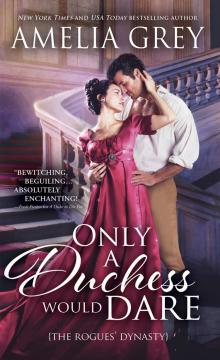 Only a Duchess Would Dare
Only a Duchess Would Dare The Earl Next Door
The Earl Next Door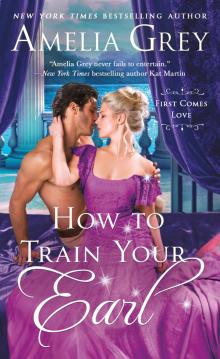 How to Train Your Earl
How to Train Your Earl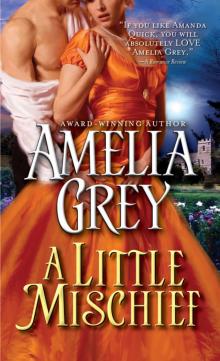 A Little Mischief
A Little Mischief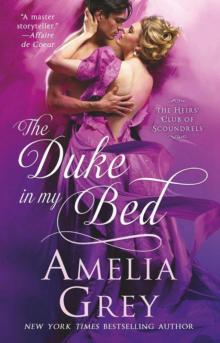 The Duke in My Bed
The Duke in My Bed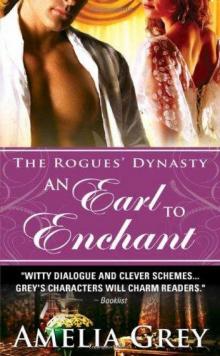 An Earl to Enchant: The Rogues' Dynasty
An Earl to Enchant: The Rogues' Dynasty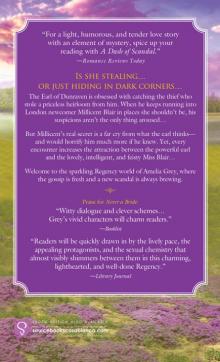 A Dash of Scandal
A Dash of Scandal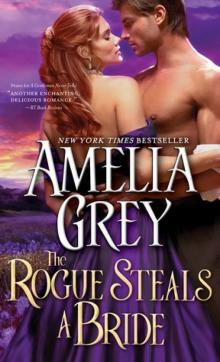 The Rogue Steals a Bride
The Rogue Steals a Bride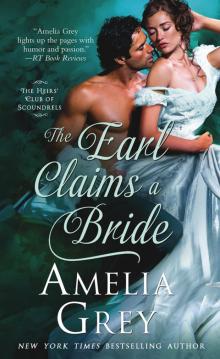 The Earl Claims a Bride
The Earl Claims a Bride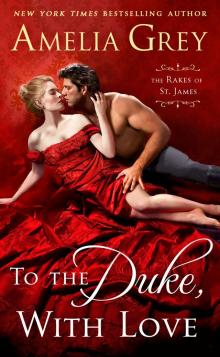 To the Duke, With Love
To the Duke, With Love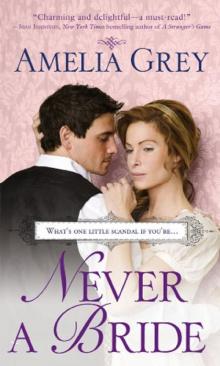 Never a Bride
Never a Bride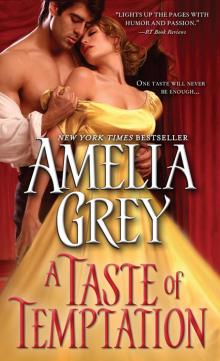 A Taste of Temptation
A Taste of Temptation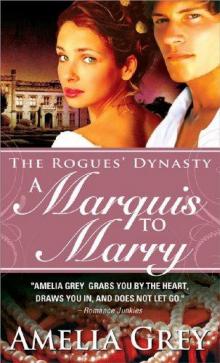 A Marquis to Marry
A Marquis to Marry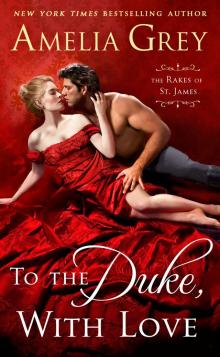 To the Duke, With Love--The Rakes of St. James
To the Duke, With Love--The Rakes of St. James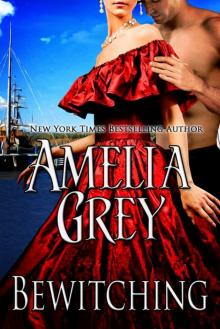 Bewitching
Bewitching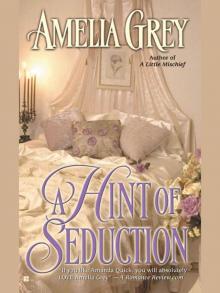 A Hint of Seduction
A Hint of Seduction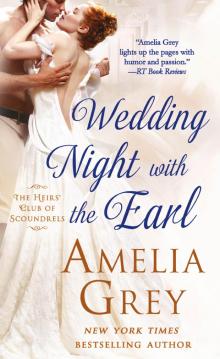 Wedding Night With the Earl
Wedding Night With the Earl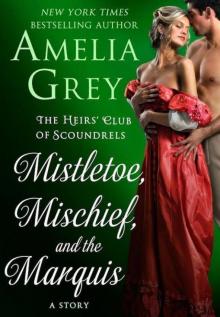 Mistletoe, Mischief, and the Marquis (The Heirs' Club)
Mistletoe, Mischief, and the Marquis (The Heirs' Club)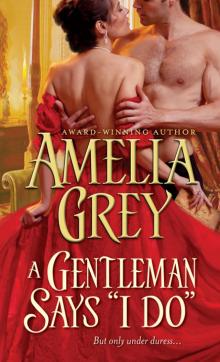 A Gentleman Says I Do
A Gentleman Says I Do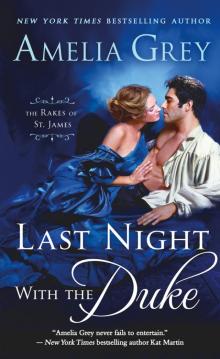 Last Night with the Duke
Last Night with the Duke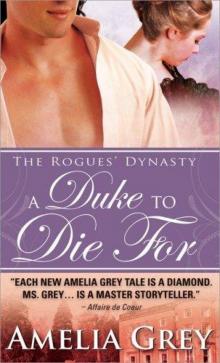 A Duke to Die for: The Rogues' Dynasty
A Duke to Die for: The Rogues' Dynasty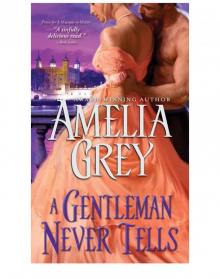 A Gentleman Never Tells
A Gentleman Never Tells The Duke and Miss Christmas
The Duke and Miss Christmas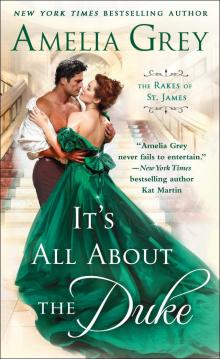 It's All About the Duke--The Rakes of St. James
It's All About the Duke--The Rakes of St. James